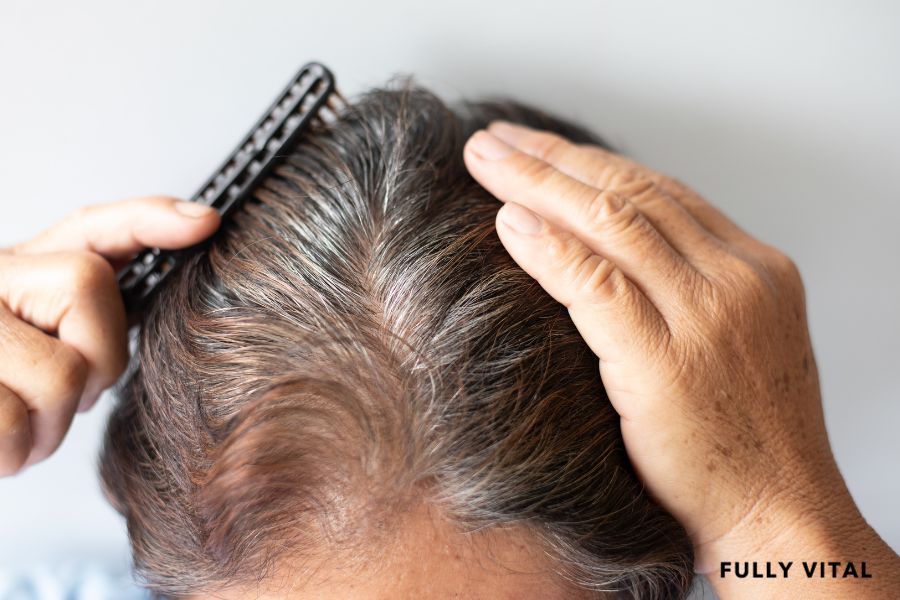
How Long Does It Take For Hair To Grow Back? Patience Is Key
Are you wondering how long it takes for your hair to grow back?
Whether you're dealing with hair loss due to a medical condition, or stress, or simply want to speed up the growth process, we have the answers you need.
Patience is key when it comes to regrowing your hair, but there are also ways to stimulate hair growth and maintain healthy hair.
In this article, we will address all your questions about hair regrowth.

I LOVE MY HAIR NOW
FullyVital hair serum and hair vitamins made tremendous improvements in my hair. I truly love my hair now.
Dorit S.,
Hair Growth Rate
The time it takes for hair to grow back varies from person to person and depends on several factors.
On average, hair grows about half an inch (1.25 cm) per month, or approximately 6 inches (15 cm) in a year.
However, this growth rate can be influenced by genetics, age, and overall health.
For some, hair may grow back more quickly, while for others, it may take longer.
Hair Growth Acceleration
If you're eager to see your hair grow back quickly, you may be wondering if there are any methods to accelerate the process.
While everyone's hair growth rate varies, there are a few strategies that can potentially promote faster hair regrowth.
Some of these methods include:
Regular Scalp Massages
Massaging your scalp improves blood circulation, which can stimulate hair follicles and promote growth.
Nutritious Diet
Eating a balanced diet rich in vitamins and minerals, particularly those that support hair health such as vitamin A, vitamin E, and biotin, can potentially speed up hair growth.1
Avoiding Excessive Heat And Styling
Excessive heat from styling tools, such as hair straighteners and curling irons, can damage hair and slow down the regrowth process.
Opt for heat-free styling methods whenever possible.
Utilizing Hair Growth Products
There are various hair growth products available on the market that claim to accelerate hair regrowth.
Look for products containing ingredients like minoxidil, biotin, and keratin, which are known to support healthy hair growth.
Variation In Hair Regrowth Duration Based On Individual Factors
Hair regrowth time can indeed vary based on individual factors.
Factors that may influence the speed at which your hair grows back include:
- Genetics: Some individuals naturally have a faster hair growth rate than others due to their genetics.
- Age: Hair growth tends to slow down with age, so you may find that your hair takes longer to grow back as you get older.
- Overall health: Your overall health, including any underlying medical conditions, can affect the rate of hair regrowth.
- Lifestyle factors: Factors such as stress, smoking, and poor nutrition can contribute to slower hair growth.
Tips For Maintaining Healthy Hair During The Regrowth Process
While waiting for your hair to grow back, it's crucial to maintain healthy hair to ensure optimal regrowth.
Here are some tips to keep your hair healthy during the regrowth process:
- Nourish your hair: Use a gentle shampoo and conditioner that are suitable for your hair type. Avoid harsh chemicals that can further damage your hair.
- Protect your hair: Use a wide-toothed comb or a brush with soft bristles to minimize breakage while combing or brushing your hair.
- Avoid excessive heat styling: Limit the use of heat styling tools, and when necessary, use a heat protectant spray to minimize damage.
- Follow a balanced diet: Consume a diet rich in vitamins, minerals, and proteins that promote hair health. Incorporate foods such as fish, nuts, eggs, and leafy greens.
- Manage stress: Chronic stress can contribute to hair loss. Practice stress-management techniques, such as meditation, exercise, or hobbies, to reduce stress levels.
Benefits Of Understanding How Long It Takes For Hair To Grow Back
Understanding the timeline for hair regrowth offers several benefits, including:
Realistic Expectations
By knowing how long it takes for hair to grow back, you can set realistic expectations for your hair growth journey.
This can prevent frustration and disappointment along the way.
Effective Hair Care Planning
Understanding the speed of hair growth allows you to plan an effective hair care routine.
You can choose appropriate products, hairstyles, and treatments that support and accelerate the regrowth process.
Identifying Underlying Issues
Slow hair regrowth may indicate underlying issues such as nutritional deficiencies or hormonal imbalances.
Recognizing this can prompt you to seek medical advice and address the root causes of slow regrowth.2

Natural Remedies And Supplements For Hair Regrowth
If you prefer a more natural approach to promote hair regrowth, there are several remedies and supplements that may help.
While scientific evidence is limited, some popular natural remedies and supplements to consider include:
Aloe Vera
Applying aloe vera gel to the scalp may stimulate hair growth and improve overall hair health.
Essential Oils
Certain essential oils, such as rosemary oil, lavender oil, and peppermint oil, are believed to promote hair growth when massaged onto the scalp.3
Vitamins And Minerals
Biotin, vitamin E, zinc, and iron are commonly recommended supplements that may support healthy hair growth.
Hairstyles And Hair Treatments Impact On Hair Regrowth
While some hairstyles and hair treatments can enhance your overall look, they may also hinder hair regrowth. Here are a few examples:
Tight Hairstyles
Wearing tight ponytails, braids, or buns frequently can cause tension in the hair follicles, leading to breakage and slower hair regrowth.
Opt for looser hairstyles whenever possible.
Chemical Treatments
Frequent use of harsh chemical treatments, such as relaxers or perming solutions, can weaken the hair shaft and hinder regrowth.
Be mindful of the frequency and intensity of chemical treatments.
Heat Styling
Excessive heat from styling tools can damage the hair, leading to hair loss and slower regrowth.
Limit the use of heat styling tools and always use heat protectant products.

Potential Downsides Of Slow Hair Regrowth
Slow hair regrowth can have a few downsides, including:
Waiting Period
Waiting for your hair to grow back can feel frustrating, especially if you have a specific hair goal in mind.
It requires patience and consistent care.
Impact On Self-Esteem
Hair loss or slow regrowth can have an impact on your self-esteem and confidence.
It's important to prioritize self-care and maintain a positive mindset during the regrowth process.
Exploring Alternatives To Waiting For Hair To Grow Back
If you're not keen on waiting for your hair to grow back naturally, there are alternative options to consider:
- Hair extensions: Hair extensions can instantly provide length and volume while you wait for your natural hair to grow back.
- Topical hair growth products: There are various topical solutions and serums available that claim to promote hair growth. Look for products containing ingredients like minoxidil or natural botanical extracts.
- Wigs and hairpieces: Wigs and hairpieces allow you to experiment with different hairstyles while your natural hair grows back.
- Scalp micropigmentation: This non-invasive cosmetic procedure involves tattooing the scalp to create the illusion of hair growth.
Unlock The Secret To Timeless Locks!Discover the magic of Fully Vital's science-backed hair growth solutions.
Ready to transform your hair? Let's get started today! |
Final Thoughts On How Long It Takes For Hair To Grow Back
Understanding the timeline for hair regrowth is crucial for those seeking to restore their hair.
While patience is key, various techniques, such as maintaining a balanced diet, practicing good hair care habits, and exploring natural remedies or supplements, can potentially stimulate healthy hair growth.
Remember that everyone's hair growth journey is unique, and it's important to be patient and consistent in your approach.
To enhance your hair regrowth journey, consider exploring the range of hair growth products offered by Fully Vital.
These products are specifically designed to halt hair aging and promote a healthier relationship with your locks.
Take the first step towards achieving the luscious, vibrant hair you desire by incorporating the right products into your routine.
Nourishing your hair and maintaining healthy habits are essential during the regrowth process.
Embrace the journey and enjoy watching your hair flourish.
Frequently Asked Questions About How Long It Takes For Hair To Grow Back
Can hair grow back after alopecia?
In some cases, hair can grow back after alopecia, but it depends on the type and cause of alopecia.
Alopecia areata, for instance, is a condition in which hair loss occurs in patches.
In many cases, the hair can regrow naturally within a year.
However, with other forms of alopecia, such as scarring alopecia, regrowth may be challenging.
Consulting with a dermatologist is crucial to determine the best approach for managing hair loss due to alopecia.
Does hair grow back faster if it was shaved or cut?
Contrary to popular belief, shaving or cutting your hair does not affect the speed of hair growth.
Hair growth occurs at the roots, and cutting or shaving the hair only affects its appearance, not its growth rate.
The growth process remains the same regardless of whether you shave, cut, or leave your hair untouched.
Can hair grow back after chemotherapy?
Yes, hair can usually grow back after chemotherapy.
The regrowth process may vary from person to person.
It's important to note that hair regrowth may take time, and the texture or color of the regrown hair may be different from before.
Patience and a healthy hair care routine can help support the regrowth process.
How long does it take for hair to regrow after chemotherapy?
The regrowth time after chemotherapy can vary.
In most cases, hair regrowth starts a few weeks to a couple of months after completing treatment.
However, the full regrowth process can take several months to a year.
It's essential to keep in mind that everyone's experience is unique, and hair regrowth may occur at a different rate for each individual.
Does hair grow back thicker after shaving?
No, shaving does not affect the thickness or density of your hair.
The appearance of hair may temporarily seem thicker after shaving due to the blunt ends, but as the hair grows, it will return to its natural thickness and density.
Is there a specific time frame for hair growth after a haircut?
There is no specific time frame for hair growth after a haircut.
The rate at which your hair grows back after a haircut depends on various factors such as genetics, overall health, and hair care practices.
On average, hair grows about half an inch per month, but individual experiences may vary.
Does hair grow back differently after a hair transplant?
After a hair transplant, the regrown hair can have a different pattern of growth than your natural hair.
This is because the transplanted hair grafts are typically taken from a different area of the scalp.
However, with proper care and continued hair growth, the regrown hair should blend in with your existing hair over time.
How long does it take for hair to regrow after a hair transplant?
The regrowth time after a hair transplant can vary based on individual factors.
Generally, it takes several months for the transplanted hair to begin growing.
New hair growth may appear within 3 to 4 months, but it can take up to a year for the full results to be visible.
Following the post-transplant care instructions provided by your surgeon is essential to ensure optimal regrowth.
Can stress affect hair growth and regrowth?
Yes, stress can have an impact on hair growth and regrowth.
High levels of stress can disrupt the hair growth cycle, leading to hair loss or slower regrowth.
Managing stress through stress-reducing techniques, self-care practices, and a healthy lifestyle can help promote optimal hair growth and regrowth.
Sources:
- Almohanna, H. M., Ahmed, A. A., Tsatalis, J. P., & Tosti, A. (2019). The Role of Vitamins and Minerals in Hair Loss: A Review. Dermatology and Therapy, 9(1), 51–70. https://doi.org/10.1007/s13555-018-0278-6
- Guo, E. L., & Katta, R. (2017). Diet and hair loss: effects of nutrient deficiency and supplement use. Dermatology Practical & Conceptual, 7(1), 1–10. https://doi.org/10.5826/dpc.0701a01
- Oh, J. Y., Park, M. A., & Kim, Y. C. (2014). Peppermint Oil Promotes Hair Growth without Toxic Signs. Toxicological Research, 30(4), 297–304. https://doi.org/10.5487/tr.2014.30.4.297







